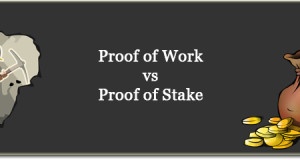So it appears we just witnessed the 2008 bank bailout, but in characteristically rapid crypto-time. At least, that is what many of the more vocal twitter voices (oxymoron?) would have us believe. The Mintpal hack, the theft of 8 million Vericoins, and the subsequent hard-fork, or bailing out, could scarcely have come at a more crazy moment; just as you thought the Uro explosion and piss-jokes must be a season’s climax, along came this! Crypto went from being a soap-opera to LOST, where nothing makes sense, everything has at least two possible meanings, and the writers appear to be making it up as they go along (note: this has more than two meanings).
Whatever VeriPal was, it was a damned interesting lesson; at least, it was to some. For others, it appeared to bring out the same old manufactured political trope most of us should be bored of by now. All of a sudden, twitter went from discussing the merits of trading urea using cryptocurrency, to a good old-fashioned ‘Libertarian’ versus ‘Socialist’ ideological cat-fight. I actually preferred the urea story-line (well, the piss jokes anyway), since the discourse emanating from the VeriPal scandal seemed just too unoriginal. No one likes flash-back episodes.
That changed however, when a little chat with @Soul_Eater_43 suddenly made me realise just how original it might be about to become. First, however, I’ll lay out my take on where the rights or wrongs of the hard-fork decision lay.
The bottom line is this: it was nobody’s decision whether Vericoin should have rolled-back except for the Vericoin developers themselves. That’s not a personal ideal I am expressing. Without a systematised or official line on the matter, explicit and in advance, the developers were free to choose which course to take. Investors have put their money into Vericoin aware that they were putting their faith in the developers decision-making (at least they should have - do your own research!). Whether you like it or not, Vericoin weren’t breaking anything other than some peoples dogma when they took the decision to hard-fork.
It was risky, but regardless, the intervening period seems to have confirmed that the community are happy with the outcome. If Mintpal had gone down, it would have taken far, far, more people with it than the few transactions that were affected, and if they can show they have learned their lessons, it would appear that all worked out for the best. The subsequent panic-sell came too late to be attributed to the hard-fork; who knows what the hell that was about?
Now, and this is crucially important, this doesn’t mean ‘hard-fork equals good’. It means that it looks like it has worked in this instance. Yes, it has set a precedent, but that is good. Precedents are always good, because precedents can be lessons if one can just see beyond the ideological lens. A lot of the talk was about an inherent evil of centralisation, that more coins will want to be more centralised; almost all coins are centralised already when it comes to power — the decision making.
Centralisation in crypto doesn’t begin and end with one coins monetary policy; that’s just the old paradigm speaking through some of you (in my opinion). Rather, what matters here, as in fiat, is systemic centralisation. A single coin’s precedent will not screw a system as diverse as this; if it works, it spreads influence until a time that it doesn’t work. Then maybe the other side will have their 5 minutes of fame (crypto-time). We should all be familiar with this pattern, though regression to the mean seems the most persistent lesson people quickly unlearn in times of panic.
If you expect every coin to adhere to one economic doctrine, then to me you are no better than the neo-liberalists who control the global financial system, nor any power of our collective past. Unless someone is actually causing you personal harm, then I see no reason why we cannot, here and now, simply diversify the old free-speech addage to include, “…and I’ll fight for their right to do it”. This way, we can compete without the bile and vitriol of the old order, and manifest an massive economics experiment the likes of which the world could never before dream. A diversity of coins, a selection of economic ideologies, and the freedom for everyone to pick and choose according to their own evolving contexts. Darwinism, digitised.
This isn’t just a new economic paradigm; this is economic secularism.
Yet it could go further still; if developers really cared about decentralisation - and this is where it starts to get interesting - then ideally all decisions would be crowd-sourced from the community through polling (hat-tip to Global Denomination Coin), with a well-resourced communication and education platform to help everyone share information on what they are voting on. Ideally, such situations as we just witnessed with Mintpal would be discussed in advance, so that when time is short, and decisions could not be reached in a legitimate fashion in short time, a set of guidance has already been legitimately established. A coin constitution, if you will. Of course, ideally you would have a panel of trusted community members and thoroughly reputable and skilled people within the wider crypto culture to act as representatives to ensure security standards are being kept, and everyone’s investment is being soundly protected long-term.
Some coins might go as far as to write other stuff into their constitutions, things like a tax on long-term stationary funds to encourage both intra-community money-flow, bounties for projects, etc. Others might choose an opt-in system of donating interest on staked coins to charity, or perhaps have a small tax-like system to help fund the wider goals of the community. Some communities may choose to leave most decisions regarding technical matters left to a group of experts; others may choose to crowd-source such things.
I could go on, but I would be belabouring a point I think is already adequately made. This isn’t just economic secularism. This is political economic secularism.
We should, as coins, as exchanges, as individuals, all be free to choose that which we consider right for ourselves, and never expect or demand any one view to rule over all others. There is no Truth in complex adaptive systems such as these, only multiple, shifting truths. But there is a ‘more right’ and ‘more wrong’, and it lies within methodology. Transparency, openness, commitment, endeavor, legitimacy.. these are all things that are prerequisite to good governance and good coins (for they are one), at all scales, and only time and the reaction of the community can judge legitimacy post-hoc, with hindsight. To deny diversity this chance, at this scale, is to risk undermining the very experimentation previously impossible not just in economics, but in politics also.
So try to stop bitching about decentralisation of other people’s communities, work like mad to make your ideology work the best, and enjoy the competition!
 CoinJoint.info Bitcoin, Altcoin and Cryptocurrency news, coverage and more…
CoinJoint.info Bitcoin, Altcoin and Cryptocurrency news, coverage and more…


